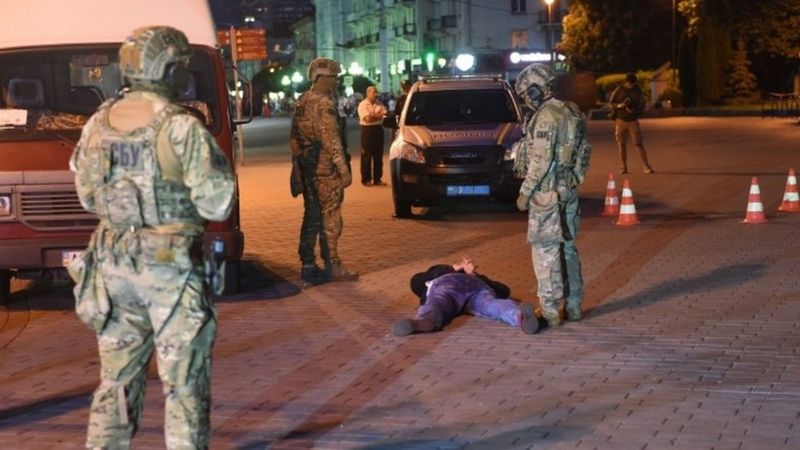Sunday, August 30, 2020
UK team helps free Iranian hostages from Somali pirates
Wednesday, August 12, 2020
Ukraine hostages freed after President Zelensky plugs Joaquin Phoenix film
Tuesday, August 11, 2020
Lutsk terrorist case: View of former law enforcers
A tense situation in Lutsk city, where a twice-convicted man seized a bus and held hostage 21 people, including children and pregnant women has become yesterday’s breaking news for all the news channels of the country... Traffic in the center of the city was blocked, an operational plan "Hostage" was announced, and even Minister of Internal Affairs Arsen Avakov arrived in Lutsk on a special flight to coordinate all the units.
... Taking hostages on such ideological grounds is a rarity for Ukraine.
“This is a very atypical crime for Ukraine. The kidnappers captured rich children for extortion, armed groups, organized crime groups. Mainly - for selfish motives, and here we are dealing with a person who was undergoing compulsory treatment in a psychiatric hospital (information about treatment was later refuted by MIA head, - ed.). Our police officers have experience of work there is no such category of criminals yet. The situation is complicated by the fact that it is very difficult or almost impossible to predict his behavior and to predict how the situation will unfold further,” says lawyer Serhiy Burlakov, who himself was previously an employee of the Ministry of Internal Affairs.
Read more from 112.international [HERE].
Monday, August 10, 2020
What does hijacker wants: How security forces negotiate with terrorists?
That is why the art of such negotiations has its own subtleties and stages, ignorance of which will certainly entail sacrifices. For example, having heard the demands of a terrorist, a common man in the street will draw conclusions about his ambitions and psychological state, while for professional negotiators, his demands become the key to resolving the situation.
The first thing law enforcement officers should do in such a situation is to make a clear distinction between instrumental and expressive motivation. If terrorists take hostages, seize buildings or kidnap people in order to exchange them for specific results (travel abroad, capture to avoid arrest for a crime committed, seizure by mentally ill people seeking to attract attention to themselves, the achievement of any political goals), then they are driven by instrumental motivation. It is in the case of such motivation that it makes sense to enter into negotiations, during which, through skillful psychological manipulations, it is possible to achieve success by lowering the level of readiness, alertness of terrorists, neutralizing it.
Read more from 112.International [HERE].
Tuesday, August 4, 2020
An FBI hostage negotiator explains how to persuade people to wear masks
...So to improve my mask-shaming game, I consulted a source who knows how to talk to unreasonable people who might accidentally kill someone: Gary Noesner, former chief of the FBI crisis negotiation unit and author of “Stalling for Time.”
“As soon as you venture into a tone or demeanor that sounds critical, they will immediately get into a defensive posture,” says Noesner. “Whether they feel strongly about it or not, they feel compelled to defend their freedom to do what they want. So any approach like that is inevitably going to fail.”
The first thing you notice when talking to Noesner is his soothing tone. His sentences sound like ocean waves, the pitch gently rising with curious questions and falling in calm reassurances. It’s a stark contrast to the harsh assertive voice I want to use at people who don’t understand the word asymptomatic.
... He explains that using science or the law or politics won’t stop bad actors; this type of coercion requires a personal appeal. He describes that strategy as an “I message.”
READ MORE FROM SFGATE.COM [HERE].





